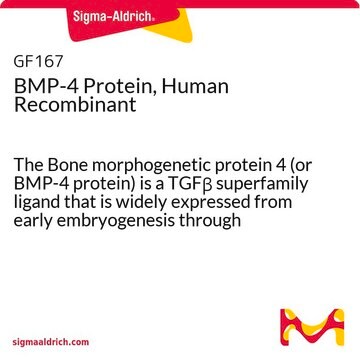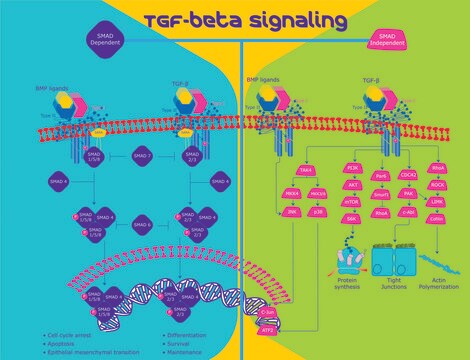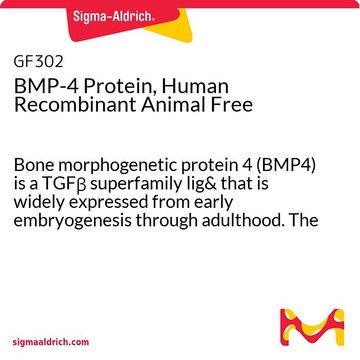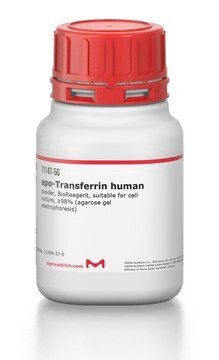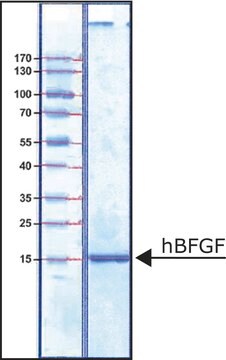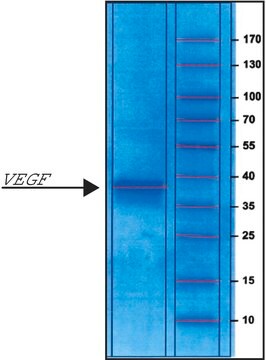SRP3016
BMP-4 human
recombinant, expressed in E. coli, ≥98% (SDS-PAGE), ≥98% (HPLC), suitable for cell culture
Synonym(s):
BMP-2B, DVR4
Sign Into View Organizational & Contract Pricing
All Photos(1)
About This Item
UNSPSC Code:
12352202
NACRES:
NA.32
Recommended Products
biological source
human
recombinant
expressed in E. coli
Assay
≥98% (HPLC)
≥98% (SDS-PAGE)
form
lyophilized
potency
5-10 ng/mL ED50
mol wt
23.8 kDa
packaging
pkg of 10 μg
technique(s)
cell culture | mammalian: suitable
impurities
<0.1 EU/μg endotoxin, tested
UniProt accession no.
shipped in
wet ice
storage temp.
−20°C
Gene Information
human ... BMP4(652)
General description
Bone morphogenetic proteins (BMPs) constitute a subfamily within the TGF-β (transforming growth factor β) superfamily of structurally related signaling proteins. Escherichia coli derived BMP-4 is a fully active homodimeric protein consisting of two 106 amino acid subunits which correspond to amino acids 303-408 of the full length BMP-4 precursor.
Application
BMP-4 human has been used for in vitro chondrogenesis in goat adipose tissue-derived mesenchymal stem cells.
Biochem/physiol Actions
Members of TGF-β (transforming growth factor β) superfamily are widely distributed throughout the body and are involved in diverse physiological processes during both pre- and postnatal life. Like BMP-7, BMP-4 (bone morphogenetic protein 4) is involved in the development and maintenance of bone and cartilage. Reduced expression of BMP-4 is associated with a number of bone diseases, including the heritable disorder Fibrodysplasia Ossificans Progressiva. BMP-4 controls the expression of miRNAs in breast cancer cell lines, thereby regulating the proliferation and migration phenotypes. It is involved in carcinogenesis and exhibits its effect through the SMAD-dependent signaling. In mice, homozygous mutations in BMP4 cause early embryonic lethality.
Sequence
KKNKNCRRHS LYVDFSDVGW NDWIVAPPGY QAFYCHGDCP FPLADHLNST NHAIVQTLVN SVNSSIPKAC CVPTELSAIS MLYLDEYDKV VLKNYQEMVV EGCGCR
Physical form
Lyophilized with no additives.
Reconstitution
Centrifuge the vial prior to opening. Reconstitute in 5 mM HCl, pH 3.0 to a concentration of 0.1-1.0 mg/ml. Do not vortex. This solution can be stored at 2-8° C for up to 1 week. For extended storage, it is recommended to further dilute in a buffer containing a carrier protein (example 0.1% BSA) and store in working aliquots at -20° C to -80° C.
Storage Class Code
11 - Combustible Solids
WGK
WGK 3
Flash Point(F)
Not applicable
Flash Point(C)
Not applicable
Certificates of Analysis (COA)
Search for Certificates of Analysis (COA) by entering the products Lot/Batch Number. Lot and Batch Numbers can be found on a product’s label following the words ‘Lot’ or ‘Batch’.
Already Own This Product?
Find documentation for the products that you have recently purchased in the Document Library.
Customers Also Viewed
Applications of small molecule BMP inhibitors in physiology and disease.
Hong CC and Yu PB
Cytokine & Growth Factor Reviews, 20, 409-418 (2009)
Overexpression of the BMP4/SMAD signaling pathway in skull base chordomas is associated with poor prognosis.
Feng Y
International Journal of Clinical and Experimental Pathology, 8, 8268-8275 (2015)
Bone morphogenetic protein 4 regulates microRNA expression in breast cancer cell lines in diverse fashion.
Alarmo EL
Genes Chromosomes Cancer, 55, 227-236 (2016)
Generation of handmade cloned embryos from adipose tissue derived mesenchymal stem cells in goat.
Malik HN
Small Ruminant Research, 121, 340-350 (2014)
Transgenic mice overexpressing BMP4 develop a fibrodysplasia ossificans progressiva (FOP)-like phenotype.
Kan L
The American Journal of Pathology, 165, 1107-1115 (2004)
Our team of scientists has experience in all areas of research including Life Science, Material Science, Chemical Synthesis, Chromatography, Analytical and many others.
Contact Technical Service